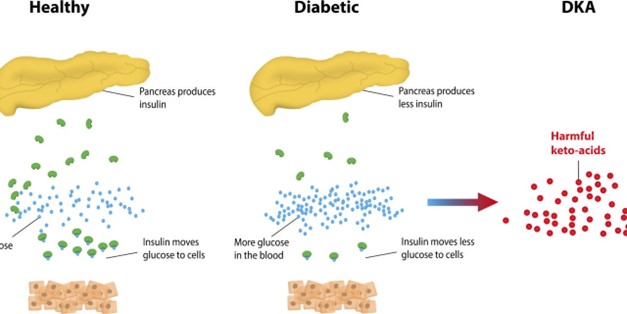A nurse is collecting data from a client who has hypoparathyroidism. Which of the following findings should the nurse expect?
Negative Chvostek’s sign
Flaccid muscles
Numbness of the hands
Hypercalcemia
The Correct Answer is C
Choice A: Negative Chvostek’s sign is the absence of facial twitching when the facial nerve is tapped. This is a normal finding and does not indicate hypoparathyroidism. A positive Chvostek’s sign is a sign of hypocalcemia, which can occur in hypoparathyroidism.
Choice B: Flaccid muscles are weak and limp muscles that lack tone and resistance. This is not a typical finding of hypoparathyroidism, as low levels of parathyroid hormone can cause muscle spasms, cramps, and tetany.
Choice C: Numbness of the hands is a common finding of hypoparathyroidism, as low levels of parathyroid hormone can cause hypocalcemia, which affects the nerve function and sensation. Numbness can also occur in the feet, lips, and tongue.
Choice D: Hypercalcemia is a high level of calcium in the blood. This is not a finding of hypoparathyroidism, as low levels of parathyroid hormone can cause hypocalcemia, which is a low level of calcium in the blood. Hypercalcemia can be a sign of hyperparathyroidism, which is the opposite condition of hypoparathyroidism.
Nursing Test Bank
Naxlex Comprehensive Predictor Exams
Related Questions
Correct Answer is A
Explanation
Choice A reason: A fruity odor in the breath is a symptom of hyperglycemia, especially when it is severe and causes ketoacidosis. Ketoacidosis is a condition where the body produces ketones, which are acidic substances that result from the breakdown of fat for energy when there is not enough insulin or glucose available. Ketones can make the breath smell fruity or like nail polish remover.
Choice B reason: A decreased appetite is not a symptom of hyperglycemia. On the contrary, an increased appetite or hunger is a symptom of hyperglycemia, as the body tries to compensate for the lack of glucose in the cells by stimulating the hunger center in the brain.
Choice C reason: An increased thirst is a symptom of hyperglycemia, as the body tries to flush out the excess glucose and ketones in the blood through urine. This leads to dehydration and thirst signals in the brain.
Choice D reason: A blurry vision at times is a symptom of hyperglycemia, as high blood glucose levels can cause swelling and damage to the lens of the eye, affecting its ability to focus light properly. This can lead to temporary or permanent vision problems.

Correct Answer is C
Explanation
Choice A reason: This test does not detect antithyroid antibodies in your blood. Antithyroid antibodies are proteins that atack the thyroid gland and can cause autoimmune thyroid diseases, such as Hashimoto’s thyroiditis or Graves’ disease. To detect antithyroid antibodies, you need a different blood test called the thyroid peroxidase (TPO) antibody test.
Choice B reason: This test does not measure the amount of thyroid hormone that ataches to a protein in your blood. Thyroid hormone can exist in two forms in the blood: free or bound. Free thyroid hormone is not atached to any protein and can enter the cells and tissues where it is needed. Bound thyroid hormone is atached to a protein called thyroxine-binding globulin (TBG) and cannot enter the cells and tissues. To measure the amount of thyroid hormone that ataches to TBG, you need a different blood test called the total thyroxine (T4) test.
Choice C reason: This test determines whether your thyroid gland is overactive, appropriately active, or underactive. TSH is a hormone produced by the pituitary gland that stimulates the thyroid gland to make and release thyroid hormones, such as thyroxine (T4) and triiodothyronine (T3). These hormones regulate many body functions, such as metabolism, growth, and development. The TSH test measures the amount of TSH in the blood and reflects how well the thyroid gland is working. If the TSH level is high, it means that the thyroid gland is underactive (hypothyroidism) and not making enough thyroid hormones. If the TSH level is low, it means that the thyroid gland is overactive (hyperthyroidism) and making too much thyroid hormones.
Choice D reason: This test does not measure the absorption of iodine and how it relates to the thyroid gland. Iodine is a mineral that is essential for the production of thyroid hormones. The thyroid gland absorbs iodine from the food and water we consume and uses it to make T4 and T3. To measure the absorption of iodine by the thyroid gland, you need a different test called the radioactive iodine uptake (RAIU) test.

Whether you are a student looking to ace your exams or a practicing nurse seeking to enhance your expertise , our nursing education contents will empower you with the confidence and competence to make a difference in the lives of patients and become a respected leader in the healthcare field.
Visit Naxlex, invest in your future and unlock endless possibilities with our unparalleled nursing education contents today
Report Wrong Answer on the Current Question
Do you disagree with the answer? If yes, what is your expected answer? Explain.
Kindly be descriptive with the issue you are facing.
